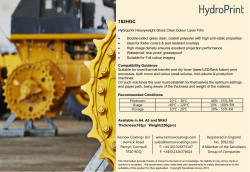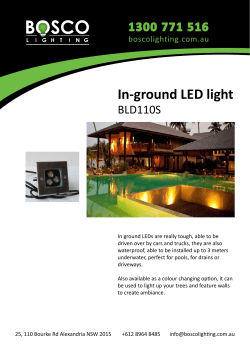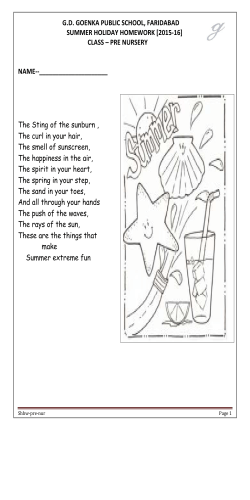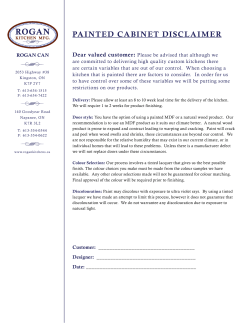
PDF - Mcor Technologies
Twin Familie www.twin-familie.de The ‘Selfie’s’ Next Frontier Challenge Using Mcor 3D printing, Twin Familie sends longstanding trend in a fresh new direction Turning the selfie trend into a thriving business. Strategy Create selfies in three dimensions using affordable, safe and photorealistic colour 3D printing technology. Results • 3D printed selfies present a new twist on the traditional selfie trend, a third dimension that makes a bigger impact and has more potential than a 2D photo. • Twin-Familie is growing rapidly through word of mouth. • The company’s 3D printed selfies give people a way to present themselves at their very best and capture their loved ones at a moment that will one day be lost forever. • • Mcor’s superior colour capability and low material costs make 3D selfies lifelike and keep costs down. Mcor’s unique environmental friendliness – using recyclable paper and emitting no toxic dust, fumes or chemicals – is ideal for a consumer-facing business like Twin-Familie. . The selfie is an evolving “art” form. First, there was the hashtag (#selfie), which originated in 2011. Then came the duck face, the selfie stick, and then the drone shot. What could possibly be left? Is the selfie over? Absolutely not, says Dieter Bielert, owner of Twin Familie, a 3D portrait service. It’s actually entering an exciting new dimension. If you live in or around Hamburg, Germany, you can visit Bielert’s website, www.twin-familie.de, make an appointment, pose for your “picture,” and voilà – in a day or two, you have a three-dimensional selfie to present to the world. Here’s how it works. You arrive for your appointment at the TwinFamilie studio, either alone or with your BFF. You step onto an electrically driven turntable that revolves very slowly, at 2.5 times per minute. Bielert, the studio owner, uses a handheld 3D scanner to capture your contours in full colour down to .1 mm resolution. “You need to sit still,” says Beilert, “and it helps if you wear bright happy colours, but nothing shiny.” The Simple Process After three minutes, he has captured 3D data representing your surface contours. The 3D scanning software turns the data into printable polygons. Meanwhile, Bielert digitally erases the turntable and other random images, and makes minor adjustments along “Although we call them ‘selfies,’ there’s a lot of substance in 3D portraiture. You capture yourself or people you love at meaningful times in their lives and in ways that a 2D portrait can’t match.” -Dieter Bielert, Owner, Twin Familie the way – for example, your shiny Mcor IRIS,” recalls Bielert. “It’s 3D-Picture.net, also uses a drone black hair may register as white extremely cost-effective, and no to capture the shapes of buildings, instead of black. He can also 3D printer can exceed the range which are printed at scale for manipulate clothing textures. of colours and colourful detail architects and planners, again it can produce. The 3D models using the Mcor IRIS. Next, the file goes to Bielert’s are very durable – effectively solid 3D printer, the Mcor IRIS from wood – and have a pleasant Although Twin-Familie is still Mcor Technologies, the industry’s surface to touch. There is nothing a side business for Bielert at this most colour-capable 3D printer. like it on the market, and all without stage, he has plans to expand. The IRIS produces full, photorealistic the use of harmful chemicals.” Based only on word of mouth, colour. With the ability to apply Business Poised to Grow per week, but he says, “When any colour anywhere, the Mcor Bielert entered the 3D selfie we start advertising, the business IRIS is the only 3D printer to business a year ago having used will increase exponentially.” He include the ICC (International scanners for years to capture the plans to hire more staff to meet Colour Consortium) Colour Map. shapes of auto parts and objects this demand. 5760 x 1440 x 508 dpi bitmap he’s producing about six 3D selfies The map ensures that the colour in local museums. Auto part in your file or on your screen scan data is used to 3D print “Although we call them ‘selfies,’ is what you get on your 3D prototypes that precisely replicate there’s a lot of substance in printed model. The IRIS’s use obsolete parts for aftermarket 3D portraiture,” says Bielert. “You of ordinary paper as the build and custom manufacturing. capture yourself or people you material enables Bielert to create Museums use 3D scanning and love at meaningful times in their durable figurine models up to 3D printing to overcome the lives and in ways that a 2D 10 inches (25 cm) tall for one-fifth challenge of providing effective, portrait can’t match. It could be hands-on education about ancient your child, your parents, your artefacts without damaging pets or yourself at your very best. the cost of competing systems. “When I was looking for the right those priceless items, and to For a lot of people, though, it’s 3D printer for this business, I was produce replicas for museum gift just a new kind of selfie and it’s immediately impressed with the shops. Bielert’s primary business, kind of cool.” © 2015 Mcor Technologies Ltd. All rights reserved. Mcor IRIS is a trademark and Mcor Technologies Ltd is a registered trademark of Mcor Technologies Ltd. All other company and product names are pending trademarks or registered trademarks of their respective holders. SELFIE-CS-30032015
© Copyright 2026










